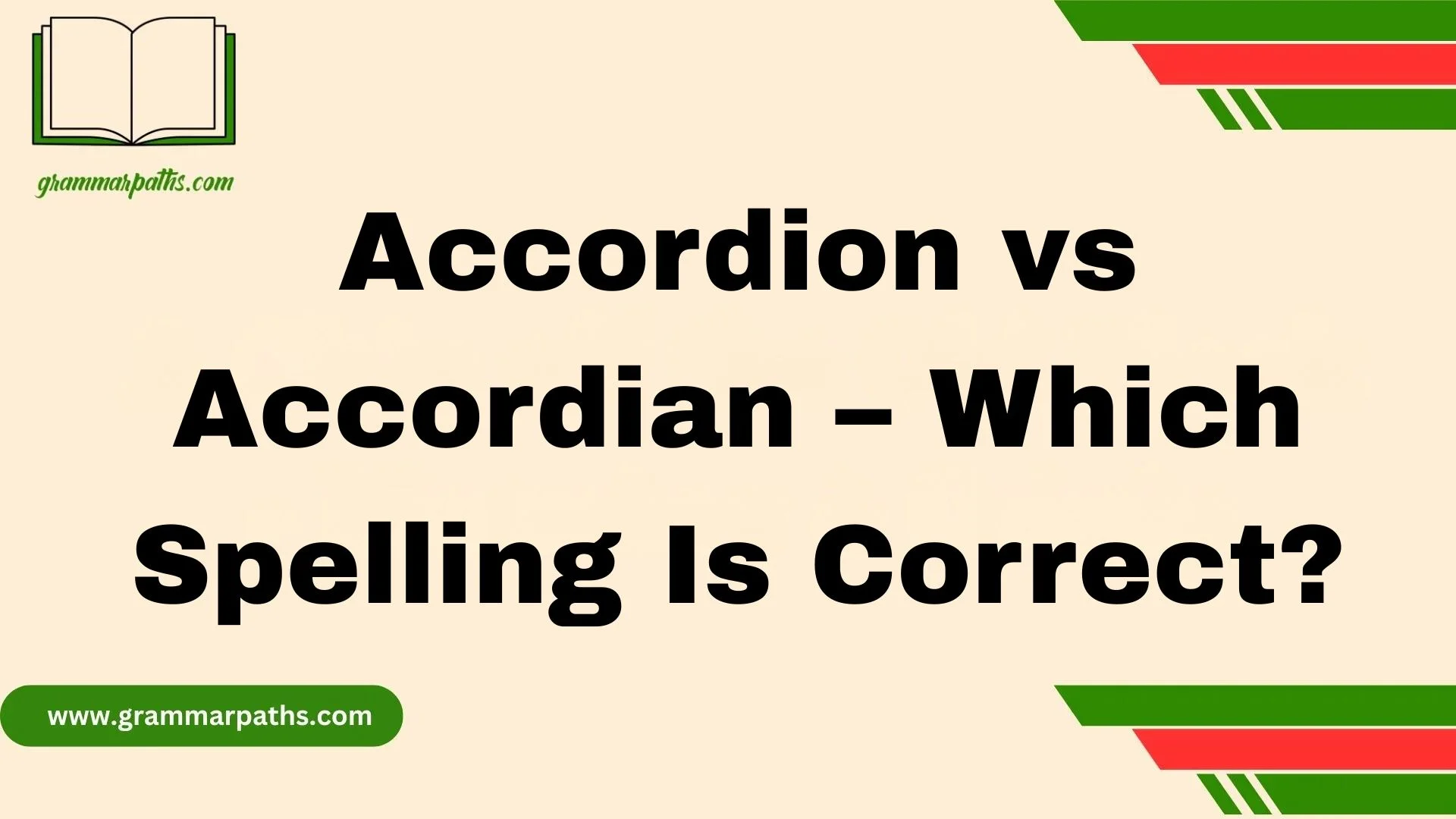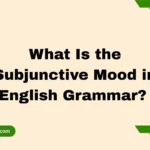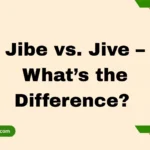Not many realize that a single misspelled word like “Accordian” can hurt a great website. I once worked on pages that had stunning design, strong calls-to-action, and high-quality images. Still, the site’s performance suffered because “Accordion” was typed wrong. That simple spelling mistake didn’t just affect search engines—the metadata was tied to the misspelling, so the page didn’t rank. Users began to question the credibility of the brand, all due to a minor typo. This is exactly why understanding the difference in “Accordion vs. Accordian – Which Is Correct?” matters in real-world digital work.
The word “Accordion” names a musical instrument, but spelling it “Accordian” is incorrect. That one-letter difference causes problems in communication, and lowers user trust. In my time helping a music teacher with a teaching page, this small issue in content development nearly ruined their site’s authority. We fixed the spelling, reworked the layout, and added better descriptions to boost accuracy. Whether you’re describing, building, or offering accordion lessons, getting the spelling right means showing professionalism from the start.
Quick Answer – Spoiler: Only One Is Right
Let’s not keep you in suspense. Here’s the truth:
| Word | Correct? | Reason |
| Accordion | Yes | Official spelling in all major dictionaries |
| Accordian | No | Common misspelling not found in any reputable source |
The correct spelling is “accordion”—with the letter “o” before the “n”.
“Accordian” is never correct, no matter how natural it might feel to type it that way.
Origin and Etymology – Where the Word Came From
Understanding where a word came from can help you remember how to spell it.
Accordion comes from the German word “Akkordeon,” which itself is derived from “Akkord,” meaning “chord” or “agreement.” That makes sense—after all, an accordion is a musical instrument that plays chords when squeezed and pulled.
So why does this matter?
- “Akkord” contains no “i”, and neither does “accordion”
- The word was first used in English in the early 19th century
- The correct spelling preserves the musical connection to harmony and chord
Here’s a simple breakdown:
| Word Part | Meaning |
| Akkord (German) | Chord / Harmony |
| -eon / -ion | Common suffix for instruments (e.g., clarion, violin) |
That “i” in “accordian” is an invention, not a variation.
Why People Say “Accordian” – Breaking Down the Confusion
If so many people write it wrong, is it really that bad?
Actually, yes. But the reason people spell it wrong makes sense:
1. The Way It Sounds
When spoken quickly, “accordion” can sound like it has an “i” slipped in before the “n.” Think of how people mispronounce “nuclear” as “nucular”. Same idea.
2. Common Phonetic Errors
English is full of words that people spell how they sound, especially if they’ve never seen them written. That’s called phonetic spelling.
Here are some similar misspelled words caused by phonetics:
| Incorrect Spelling | Correct Spelling | Reason for Mistake |
| Febuary | February | The “r” gets swallowed in speech |
| Seperately | Separately | Misheard vowel placement |
| Definately | Definitely | Misheard syllable |
| Wensday | Wednesday | Dropped “d” sound |
“Accordian” fits right in.
How to Remember the Correct Spelling – Mnemonics That Work
Here’s the fun part. Want to never misspell accordion again? Try these foolproof tricks.
Memory Tricks and Mnemonics:
- “There’s no ‘I’ in team—or in accordion.”
- Think: “Accordion has two C’s and two O’s”
- Break it down: A + CORD + ION → “A chord + sound = Accordion”
- Visual trick: Picture a musical “chord” and “ion” explosion (sound)
Quick Rhyme to Lock It In
“To play the accordion, I must accord on,
Not with an ‘i’, just keep pushing on.”
Simple. Sticky. Effective.
Accordion in Context – What the Word Really Refers To
Spelling becomes easier when you know how the word is used in real life.
1. Musical Instrument
The most famous usage, of course, is the accordion—a boxy, bellows-driven instrument played in folk, jazz, and even punk music.
Fun fact: The first accordion was invented in 1822 by Friedrich Buschmann in Berlin.
2. UI Design (Tech World)
In web development, an accordion menu is a design feature where content expands when clicked.
Useful in:
- Mobile apps
- FAQ pages
- Interactive quizzes
- E-learning platforms
“We used an accordion menu for mobile navigation to save screen space.”
Real-Life Usage Examples – Sentences from Students, Teachers & Professionals
Let’s put the word accordion in action.
For Students
- “In music class, I learned how to play the accordion.”
- “The accordion section in the test was confusing, but I figured it out.”
For Teachers
- “Please open the digital textbook’s accordion menu to find Chapter 3.”
- “Highlight the accordion-style notes in your homework.”
For Professionals
- “Our UX team implemented an accordion layout to reduce page clutter.”
- “I attached the accordion files to the email—please review them before 5 PM.”
Step-by-Step: How to Double-Check Your Spelling in Everyday Writing
Even with the best memory tricks, mistakes happen. Here’s how to stay sharp:
Spelling Check Toolkit
Step 1: Slow down and pronounce each syllable: A-c-c-o-r-d-i-o-n
Step 2: Use these free spell-check tools:
- Grammarly: https://www.grammarly.com
- Hemingway Editor: https://hemingwayapp.com
- Google Docs spell checker
Step 3: Search the word in Merriam-Webster or Dictionary.com before submitting anything professional
Step 4: Write the word in context at least 3–5 times. Memory sticks when used in sentences.
Why Getting It Right Matters – More Than Just a Typo
Think it’s just a tiny mistake? Think again.
Spelling mistakes like “accordian” can impact:
Your Academic Grades
Teachers often deduct marks for incorrect spelling. One misspelled word can pull down the tone of your entire paper.
Your Professional Credibility
Imagine this:
You’re applying for a job, and your resume says you’re “skilled with UI accordian menus.”
Red flag. It instantly signals lack of attention to detail.
Your Online Presence
Search engines like Google prioritize correct spelling. If you write “accordian tutorial,” you’re likely to miss the top results for “accordion tutorial.”
| Platform | Impact of Misspelling |
| Lowers professionalism | |
| Blogs/Websites | Reduces SEO ranking |
| Job Applications | Reduces credibility |
| Class Assignments | May lead to lost points |
Fun Facts About the Word “Accordion”
To break up the lesson, here are some surprising facts:
- The Guinness World Record for the largest accordion ensemble featured 1,661 players in China in 2011.
- “Weird Al” Yankovic made the accordion famous in comedy music.
- Fashion designers use accordion pleats in dresses and skirts.
- In data science, “accordion charts” are used in dashboards.
So this word isn’t just for music geeks.
Bonus: Common Spelling Mistakes Like “Accordian” You Should Avoid
You’re not alone. Here are other spelling slip-ups just like “accordian.”
| Incorrect | Correct | Mnemonic Tip |
| Definately | Definitely | Ends in -nitely, like infinite |
| Seperately | Separately | There’s a rat in “separately” |
| Occured | Occurred | Double “c”, double “r” |
| Enviroment | Environment | There’s an “n” before the “m” |
| Recieve | Receive | i before e, except after c |
| Restarant | Restaurant | Rest + au + rant |
Mistakes happen. What matters is learning the correct form and sticking with it.
Final Recap – Quick Cheat Sheet
Here’s a last glance to help you walk away confident:
| Spelling | Correct? | Context of Use |
| Accordion | Yes | Music, design, pleats, tech interfaces |
| Accordian | No | Incorrect everywhere |
Key Takeaway: There is only one right spelling, and knowing it will help you appear smarter, more credible, and more professional in every setting.
Conclusion
Using the correct spelling—“Accordion” instead of “Accordian”—is more than just a grammatical detail. In the world of content creation, and music education, a small typo can lead to lost traffic, confusion, and even damage your brand reputation. Whether you’re a music instructor, a small business, or running an educational website, maintaining consistent spelling helps build trust, increase searchability, and ensure you’re reaching the right audience. Always double-check your instrument spelling, use spellcheck, and remember that even a minor mistake can have a major impact.
FQAs:
FAQ 1: What is the correct spelling—Accordion or Accordian?
The correct spelling is “Accordion.” The version with an “i”—“Accordian”—is a common misspelling and not recognized in standard dictionaries.
FAQ 2: Why is using the correct spelling important in web content?
Using the correct spelling ensures improves user trust, and avoids issues like lost traffic, ranking drops, and spelling inconsistencies that can affect your site’s credibility.
FAQ 3: Can a typo like “Accordian” affect my Google ranking?
Yes. Even a minor typo like “Accordian” can interfere with searchability, conversion rate, and how Google indexes your domain name, especially if it’s used in metadata or keywords.
FAQ 4: How can I avoid spelling mistakes on my music website?
Use spellcheck, reference the industry standard, and review your content, ad copy, and descriptive text. Tools like Grammarly or Google Docs can help ensure spelling consistency.
FAQ 5: Does spelling affect branding for music educators?
Absolutely. Music instructors and education platforms benefit from clear, professional branding. Consistent spelling builds credibility, attracts more students searching, and improves the overall user experience.
Sources and References
- Merriam-Webster Dictionary
- Dictionary.com – Accordion
- Cambridge Dictionary
- Grammarly Spelling Checker
- Accordion Facts – Guinness Records

Emma Brooke is a passionate language expert and contributor at GrammarPaths.com, where she helps learners navigate the complexities of English grammar, idioms, and effective writing. With a strong academic background and years of teaching experience, Emma excels at turning tricky grammar rules into simple, practical lessons that readers can easily grasp.












